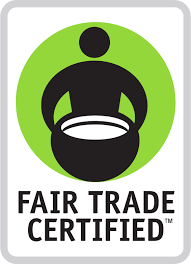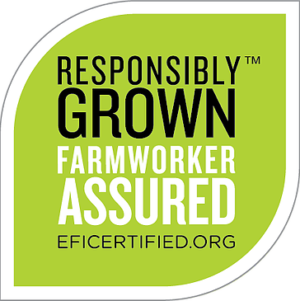Center for Fair & Alternative Trade
Social Certification Programs in US Agriculture: Quantifying Impacts on Workers by Alexandra Hill
Presented by Alexandra Hill, Assistant Professor of Agricultural and Resource Economics, Colorado State University
On Thursday, November 21, 2019, Dr. Alexandra Hill presented proposed research on the impacts of social certification programs in US agriculture. The project is joint with Gail Feenstra, Christy Getz, and Ron Strochlic – researchers at the University of California, Davis and the University of California, Berkeley – who developed the research objectives, project scope, and qualitative analysis plan. The research is the first comprehensive look at the viability of social certification for improving US farmworker wellbeing which also examines impacts on employers and industry stakeholders. Roughly 500,000 US farms hire the bulk of workers, employing 2.4 million farmworkers, 1.4 million of whom work in crop production. About half of these workers are undocumented and many are children and youth, injecting important social justice issues into US agriculture. These agricultural workers face low wages, seasonal employment, high rates of occupational injuries and illnesses, limited access to healthcare, discrimination, and sexual harassment. However, in many cases, the undocumented status, limited English fluency, and employer marginalization of agricultural workers create barriers to reporting abuse, sub-legal wages, and unsafe working conditions. US agricultural employers are also harmed by these problems, as there is evidence that labor shortages and high employee turnover are reducing profit margins. To address these challenges, many new generation employers seek to run sustainable farms that respect worker health and safety, advance food safety standards, and uphold legal and moral farm production practices. The problems also affect rural farm communities which typically have lower median household incomes than urban areas and lower investment in infrastructure and social services. Pesticides and fertilizers from farms often contribute to poor air and water quality and increase the need for health services in rural regions.



Over recent years there has been a rise in market-based certification systems addressing social and environmental problems in agriculture. Certification programs attempt to increase worker wellbeing and reduce social ambiguities for buyers of agricultural commodities. These programs represent a popular means for encouraging sustainable production techniques and guaranteeing supply chain integrity for buyers. While certification programs have largely been used to address globally traded commodities, they have recently been applied in countries like the United States. Hill’s research seeks to quantify potential program impacts for US workers and communities, analyzing two key certification programs: Fair Trade USA (FTUSA) and the Equitable Food Initiative (EFI). According to their website, FTUSA seeks to “support responsible companies, empower farmers, workers, and fisherman, and protect the environment.” EFI is a “non-profit social enterprise to transform agriculture through farmworker engagement.” Both programs issue premiums to workers and aim to increase worker income, reduce child labor and worker abuse, increase legal protections, and strengthen communities. In addition, both programs seek to improve workforce development, environmental standards, and stakeholder collaboration.
The short-term objectives of the proposed research include quantifying the impacts of FTUSA and EFI on the wellbeing of agricultural workers, identifying the costs and benefits of the two programs, and examining the spillover effects on rural communities. Although the research is expected to reveal positive worker and producer impacts, preliminary data reveals the complexities of attributing ongoing changes to program efforts and the need for refined empirical measures on worker outcomes.